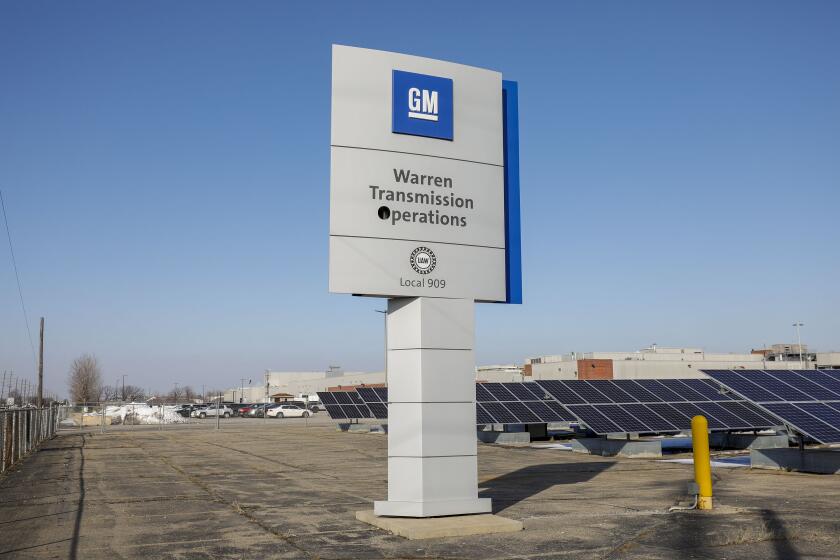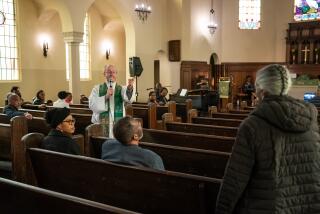‘We’re old news, but we’re still living this’ — mistrust still flows in Flint

- Share via
Flint, Mich. — An outsider walking through neighborhoods on this city’s north side might not see much to feel optimistic about.
On block after block, houses stand abandoned and burned out. Weed-choked empty parcels dot the streetscape. Schools and churches are boarded up.
But neighborhood leaders like Leon El-Alamin and Timothy Abdul-Matin don’t see hopelessness in the places where they grew up. They see an opportunity. They are teaching job skills to ex-prisoners and enlisting them in cleaning up blighted properties.
“We want to empower ourselves — we don’t want a handout,” said El-Alamin, who with Abdul-Matin founded the M.A.D.E. Institute in 2015 to help former inmates start over in a city that needs its own turnaround.
Democratic progressives Bernie Sanders and Elizabeth Warren slapped back against moderate rivals who ridiculed “Medicare for All” during a fierce Democratic presidential debate Tuesday night.Here are our 6 big takeaways from Night 1 of the debates in Detroit>>
Their efforts come at a time when the nation’s political spotlight will shine on Michigan because of the Democratic presidential debate 60 miles south in Detroit on Tuesday and Wednesday. Some candidates have already campaigned in the area, but so far there hasn’t been a renewed focus on Flint’s struggles.
The once-thriving city became the unwilling national symbol for urban decline and government neglect after it was devastated by the disappearance of the auto industry and an eroding tax base. Then, a state-driven attempt to save money by changing the city’s water supply led to the drinking water being contaminated with dangerous levels of lead — and at least a dozen deaths.
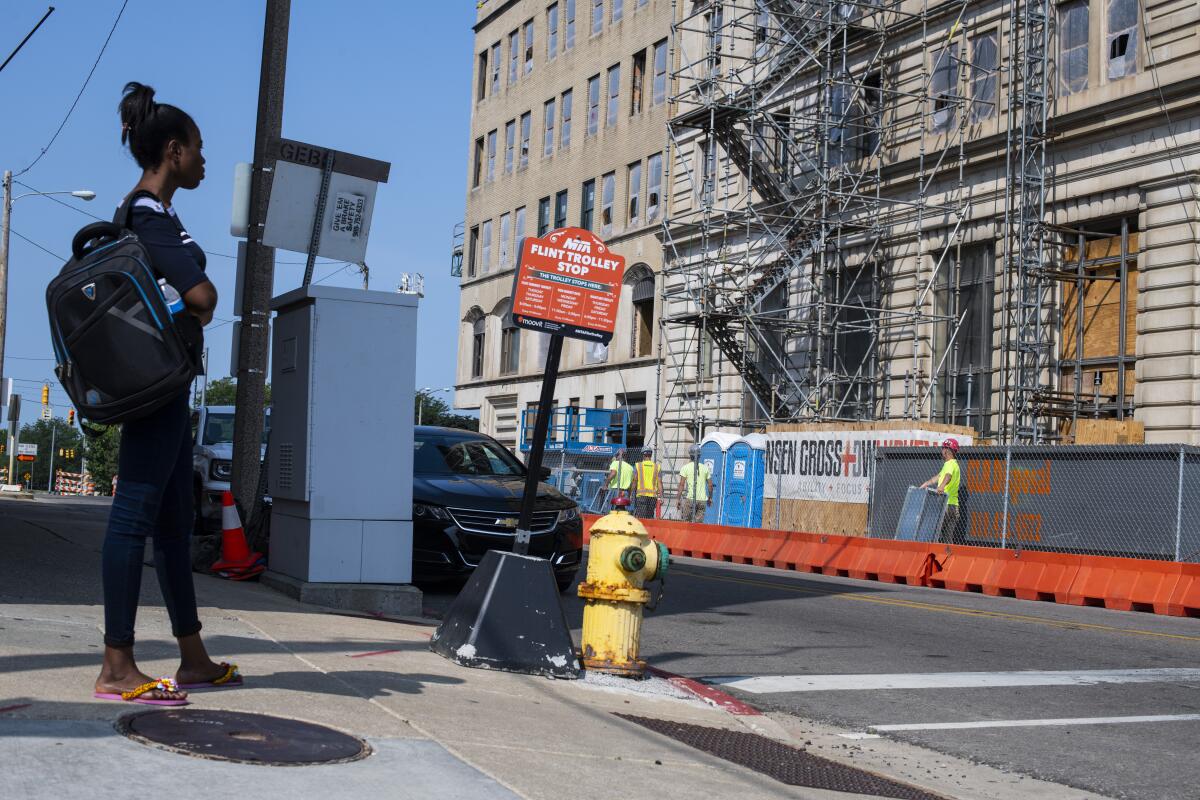
Locals in Flint now trust government officials about as much as they trust the water that runs through their taps. Residents are doing for themselves and leaning on each other, and a new generation of civic leaders is taking on the challenge of reviving the city.
“People took responsibility for what was happening in their community because that was the only thing that gave them peace,” said Isaiah Oliver, who grew up on food stamps here and is now the head of the Community Foundation for Greater Flint.
Oliver is pouring foundation money into literacy, healthcare and early childhood intervention. The founders of the M.A.D.E. Institute are aiming to make the men and women they refer to as “returning citizens” a bright part of Flint’s future. And an independent journalist founded a news outlet dedicated to chronicling her hometown’s fortunes.
They and many others are out to prove that what was one of America’s great industrial cities 40 years ago is on the verge of a comeback, with or without the help of politicians.
Democrats are set to debate in Detroit: Will Bernie Sanders and Elizabeth Warren battle? Will gun control be the topic of the night?
Four years ago, presidential candidates Hillary Clinton and Bernie Sanders made Flint a focal point by visiting several times, calling on then-Gov. Rick Snyder to resign because of the water crisis and debating here. But when a dozen Democratic candidates addressed thousands of African American voters at the NAACP convention in Detroit last week, the water crisis barely came up.
The state’s takeover of the city because of its troubled finances led to the decision to switch to the Flint River for its water supply in 2014. Residents quickly complained about brown, foul-smelling tap water.
Elected leaders and state officials insisted the water was safe, until high levels of lead were detected in the blood of the city’s children. The warmer, less-treated water from the river was allowing more iron and lead from the city’s aging pipes to leach into the water. One study found that fertility rates in women dropped and fetal death rates soared.
More than $450 million is now being spent on replacing pipes and other remediation efforts. But five years on, people here rarely use tap water. And they’re beset by other problems.
The median household income in 2017, the latest year for which data are available, was $26,330, less than half of the nation’s average. About 41% of the city’s residents live in poverty, compared with 12.3% nationwide.
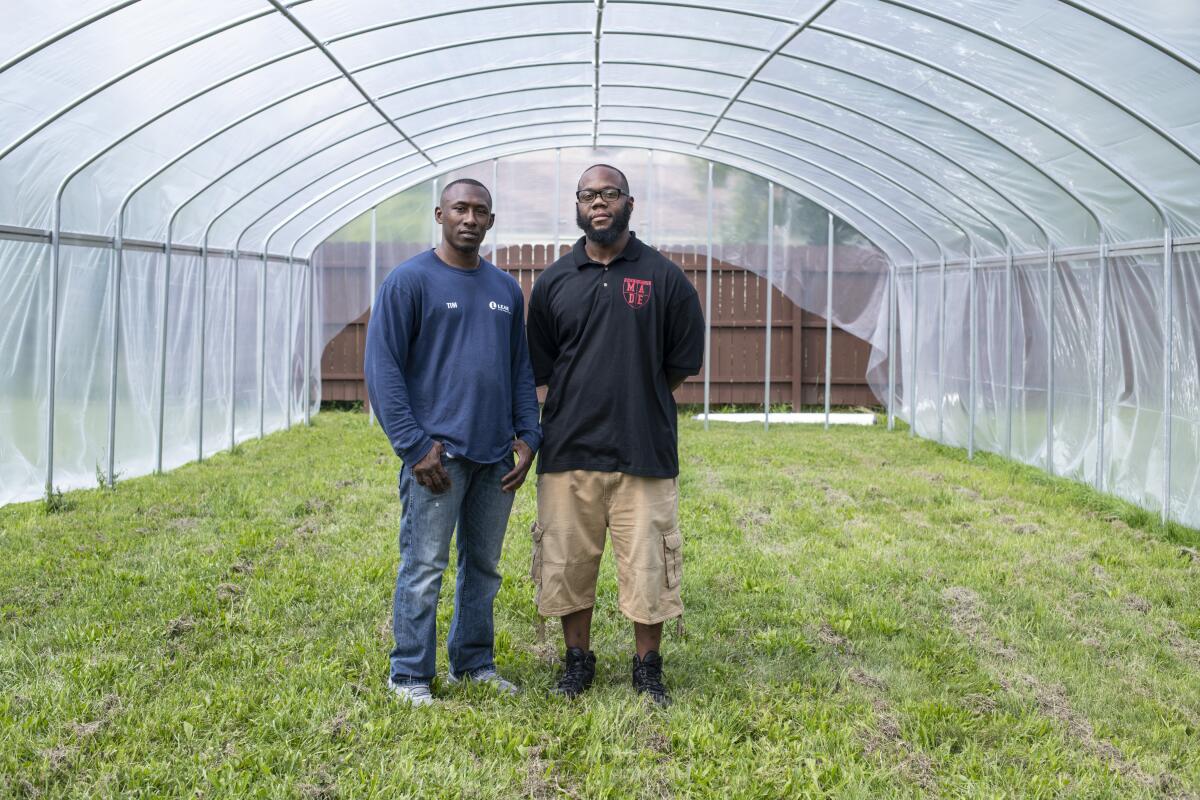
El-Alamin, 38, and Abdul-Matin, 36, are trying to ensure former inmates don’t add to those percentages. At the M.A.D.E. Institute, they aim to teach life and career skills to participants with paths similar to their own.
The two met while serving sentences in state prison, El-Alamin for drug and gun-possession offenses, Abdul-Matin for armed robbery and drug offenses. They became best friends and were released months apart in 2010. Both said they gave in to the pull of street life as teens because that’s mostly what they saw around them while growing up in north Flint.
“In Flint, where the economy is destroyed, you really don’t see a future beyond high school,” El-Alamin said. “This is why young people end up doing what they’re doing.”
Gen. John Hyten, President Trump’s nominee as vice chair of the Joint Chiefs of Staff, appears likely to win Senate confirmation despite allegations.
Supported by grants and donations, their organization has turned three formerly abandoned houses on a quiet street in the city’s north side into transitional apartments. El-Alamin and Abdul-Matin plan to launch a vocational-training center, as well as an incubator for IT and green-energy businesses.
“It can’t be a GM-dominated city anymore,” El-Alamin said.
Flint’s decline began when GM effectively abandoned the city, and that fostered the water crisis.

Flint — where more than 4 in 10 properties are vacant — was built to serve a major manufacturing sector and a population twice as large as the 98,000 who live here now. Water stagnates longer in miles of underused city pipes, which became a deadly problem with the new water source.
“The history of the city … not only set the groundwork for the water crisis to happen in the first place, but it literally made the water worse because it was moving through a ghost city of the past,” said Anna Clark, author of “The Poisoned City: Flint’s Water and the American Urban Tragedy.”
GM was founded in Flint in 1908 and by 1980 it employed 80,000 workers here. The per capita income for young workers was the highest in the country at the time. The legacy of wealth from a more prosperous era can still be found in places such as the Flint Institute of Arts, which boasts works by the likes of Renoir and Rodin.
A GM factory in Warren, Mich., is closing as Democrats come to Detroit to debate. Some workers, in a county and a state key to the 2020 presidential race, wonder whether elected officials can or will help.
“I remember neighborhood kids playing outside, a GM town where most people worked in the shop,” said Jiquanda Johnson, the founder and publisher of Flint Beat, an independent online news source.
Johnson, 43, grew up bouncing between her mom’s house outside Flint and her grandmother’s house on the north side of the city. She recalls houses with manicured lawns and ice cream trucks stopping by.

“The churches would get together in the summer and have revivals,” she said. “The parks were filled with kids.”
To people like Johnson who have seen Flint at its best, the city is not a lost cause.
The journalist, who previously worked at the Flint Journal, Detroit News and NBC News, started Flint Beat in 2017 partly out of frustration that news outlets were focused on what was trending — and Flint wasn’t trending anymore.
“I’m taking ownership of this thing — I’m the journalist of Flint,” Johnson says of her attitude then and now.
“We’ve gotten away from throwing ourselves into the communities we cover,” Johnson said. “And that’s how you get the story.”
To truly get the story of Flint’s hardships requires looking back to when the good days turned bad.
In the late 1980s and ‘90s as the auto industry shifted jobs away from Flint — GM employs just 4,000 in the city now — things started to change. Gang activity spiked. Shootings became commonplace.
Violence worries Johnson even more now that she has a 16-year-old son and 12-year-old daughter. They live just outside Flint but can still hear gunshots and police helicopters.
Flint can seem like two cities. While many residents continue to worry about the drinking water, public safety and blighted neighborhoods, a quiet economic renaissance is taking shape.
In June, GM announced plans to hire 1,000 workers at its Flint assembly plant in a $150-million push to beef up its full-size truck production. That’s part of a larger $1.6-billion infusion of investments by the company in the city since 2013.
There are signs of life in other areas too, notably the cobblestone downtown strip, a postcard-perfect cluster of elegant brick and stone buildings from the city’s heyday.
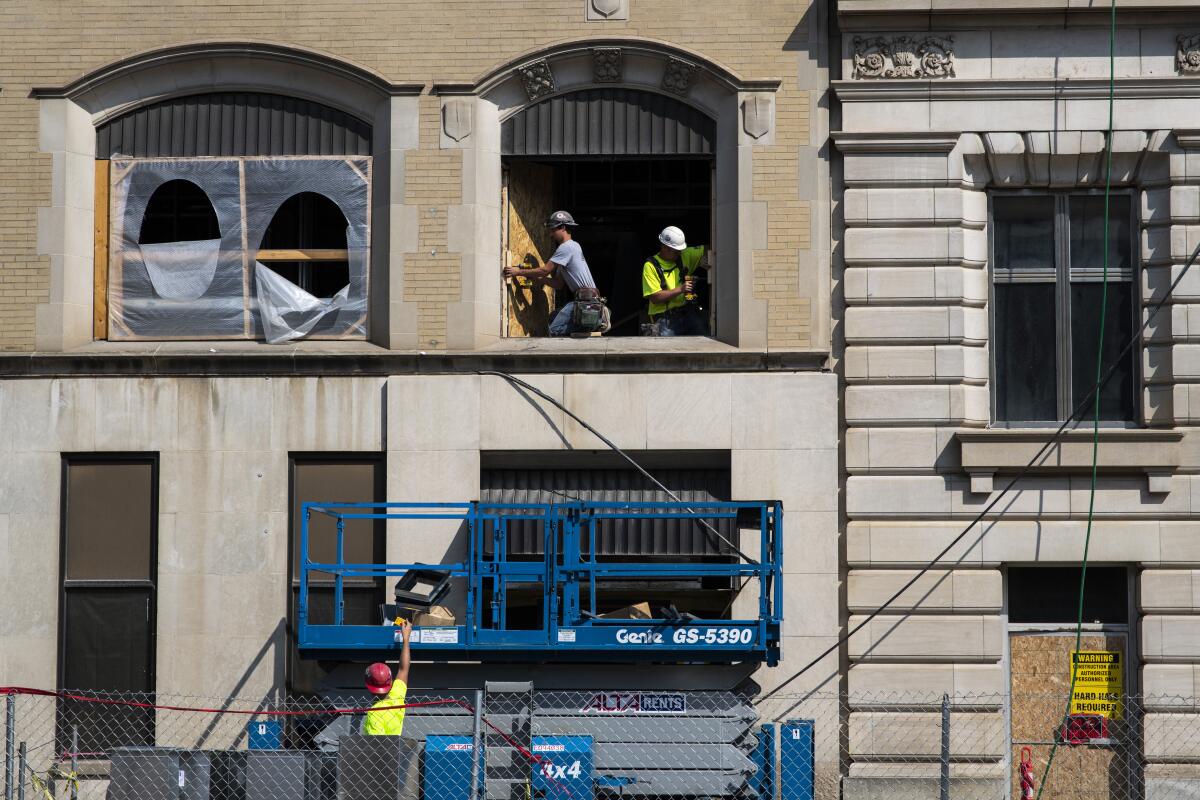
Socially conscious eyewear brand Genusee makes glasses from the city’s surplus of used plastic water bottles. Entrepreneur Kiara Tyler won backing from venture capitalists for her youthful fashion brand Kalm Clothing, housed in the newly reopened Ferris Wheel Innovation Center.
When Democratic presidential candidate Beto O’Rourke held a public town hall at the center last week, the former Texas congressman was well received despite giving the water crisis only a brief mention. Sen. Cory Booker of New Jersey held a closed-door meeting on the water crisis with community leaders the same day. Washington Gov. Jay Inslee talked with Flint residents Monday about the city’s recovery. Former HUD Secretary Julián Castro and New York Sen. Kirsten Gillibrand have also visited.
Other candidates who haven’t been to Flint have spoken of it and proposed measures to protect vital infrastructure.
California Sen. Kamala Harris has introduced legislation that would provide nearly $220 million to safeguard the nation’s drinking water supply. (California has its own problems with water. Gov. Gavin Newsom recently signed a law to divert $130 million of the state’s clean-air budget to cleaning the drinking water.)
In Flint, recovery and revival go hand-in-hand.

Oliver, 38, was born and raised in the city’s northwest side by a single mother who relied on food stamps to feed him and his two younger brothers.
Now the head of a foundation with about $250 million in assets — and a father of four — he too made a personal decision to take ownership of Flint’s problems.
He says the city’s well-funded charitable organizations, most notably the Charles Stewart Mott Foundation with its $3 billion in assets, have helped fill the gaps when Flint’s problems exceeded the capacity of its local government.
The question now is this, Oliver said: “How do we take full advantage of our opportunity to adapt to a new reality?”
The lack of public trust will be harder to overcome. Hundreds of people who refuse to believe the city’s tap water is safe still come for free bottled water at churches and other locations.
Last week, cars started showing up at 4 a.m. at Bethel United Methodist Church. By midmorning, the line stretched around a city block and down a side street. Residents living close by came with shopping carts.
Harold Woodson, who coordinates the church’s giveaway, stood next to cases of water stacked as high as his shoulders. The crisis may not be generating headlines any longer, he said, but the anxiety and need remain.
“We’re old news, but we’re still living this.”
More to Read
Get the L.A. Times Politics newsletter
Deeply reported insights into legislation, politics and policy from Sacramento, Washington and beyond. In your inbox twice per week.
You may occasionally receive promotional content from the Los Angeles Times.



